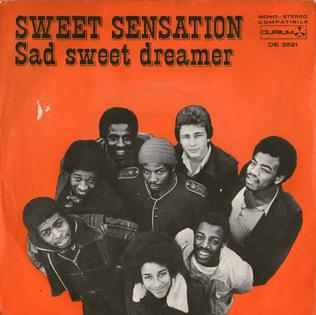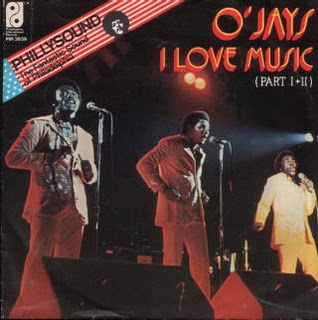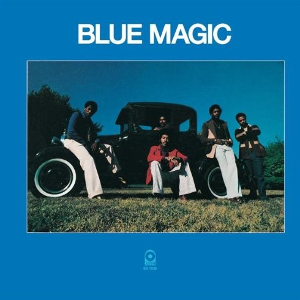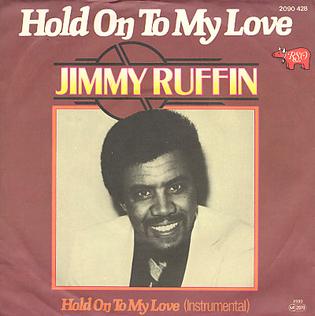
Blue Magic is an American R&B and soul group, and one of the more popular Philadelphia soul groups of the 1970s. Founded in 1972, the group's original members included lead singer Ted Mills with Vernon Sawyer, Wendell Sawyer, Keith Beaton, and Richard Pratt. Their most notable songs included smooth soul ballads such as "Sideshow", "Spell", "What’s Come Over Me", "Three Ring Circus", and "Stop to Start".

"Didn't I (Blow Your Mind This Time)" is a song by American soul group the Delfonics, co-written by producer Thom Bell and lead singer William Hart. It was released as a single in 1969 on the Philly Groove record label and appeared on their self-titled third album the following year. The song reached number three on the Billboard R&B chart and number ten on the Billboard Hot 100 in 1970. Overseas, the song peaked at number 22 on the UK Singles Chart in and number 81 in Australia. The Delfonics won a Grammy Award for Best R&B Vocal Performance by a Duo or Group for the song in 1971.

"Until You Come Back to Me (That's What I'm Gonna Do)" is a song written by Morris Broadnax, Clarence Paul, and Stevie Wonder. The song was originally recorded by Stevie Wonder in 1967, but his version was not released as a single and did not appear on an album until 1977's anthology Looking Back. The best-known version of this song is the 1973 release by Aretha Franklin, who had a million-selling top 10 hit on Billboard charts. The song reached No. 1 on the R&B chart and No. 3 on the Hot 100 chart in 1974. It became an RIAA Gold record.

"You Are Everything" is a soul song written by Thom Bell and Linda Creed and originally recorded by the Philadelphia soul group The Stylistics.

"Sad Sweet Dreamer" is a song by Sweet Sensation, which was a number-one single on the UK Singles Chart for one week in October 1974.

"When Will I See You Again" is a song released in 1974 by American soul group The Three Degrees from their third album, The Three Degrees. The song was written and produced by Kenny Gamble and Leon Huff. Sheila Ferguson sang the lead, accompanied by Fayette Pinkney and Valerie Holiday. Billboard named the song number 67 on their list of 100 Greatest Girl Group Songs of All Time.

"Still" is a 1979 song by the soul music group the Commodores. It was released as a single on Motown Records with "Such a Woman" as the B-side. The song appears on their 1979 hit album Midnight Magic. This was their last No. 1 hit in the country.

"I Love Music" is a song by American R&B group The O'Jays. It was written by production team Gamble and Huff. The song appeared on The O'Jays 1975 album, Family Reunion. The single reached number five on the US US Billboard Hot 100 and number one on the soul singles chart. In the UK, the song peaked at number 13 in the Top 40 singles charts in March 1976. The single spent eight weeks at number one on the US Disco File Top 20 chart.

"Show and Tell" is a popular song written by Jerry Fuller and first recorded by Johnny Mathis in 1972. This original version made it to #36 on the Easy Listening chart.

"You're the Best Thing That Ever Happened To Me" — also known simply as "Best Thing That Ever Happened To Me" — is a song written by Jim Weatherly, and produced by Don Law. It was first recorded in 1973 by Danny Thomas. Soon after it was done by Ray Price from his album You're the Best Thing That Ever Happened To Me. The song enjoyed two runs of popularity, each by an artist in a different genre.

"Love Ballad" is a song by R&B/Funk band L.T.D. Jeffrey Osborne is the lead singer.

"Fire" is a song by R&B/funk band Ohio Players. The song was the opening track from the album of the same name and hit No. 1 on both the Billboard Hot 100 and the Hot Soul Singles chart in early 1975. It spent two weeks atop the soul chart. "Fire" was the Ohio Players' only entry on the new disco/dance chart, where it peaked at No. 10. The song is considered to be the band's signature song along with "Love Rollercoaster".

"Feel Like Makin' Love" is a song composed by singer-songwriter and producer Eugene McDaniels, and recorded originally by soul singer-songwriter Roberta Flack. The song has been covered by R&B and jazz artists including D’Angelo, Roy Ayers, Gladys Knight & the Pips, Lou Rawls, Isaac Hays, George Benson, Jeffrey Osborne, Larry Coryell, Johnny Mathis, and Marlena Shaw.

Blue Magic is the eponymous debut album by American soul group Blue Magic, produced by Norman Harris and released in 1974 on the Atco label.

"Hang On in There Baby" is a song written by American musician Johnny Bristol and arranged by H. B. Barnum as the title track from his first album. It was released as a single in 1974, reaching No. 8 on the U.S. Hot 100 and No. 2 on the U.S. R&B chart. In the UK it reached No. 3.
Bobby Eli was an American musician, arranger, composer and record producer from Philadelphia. He was a founding member and lead guitarist of Philadelphia studio band MFSB.

"I'm Stone in Love with You" is a 1972 single by the Philadelphia soul group The Stylistics. The song is noted for lead singer Russell Thompkins Jr.'s distinctive falsetto singing, which he employs through most of the record. The song was written by Thom Bell, Linda Creed, and Anthony Bell.

"Hold On (To My Love)" is a song written by Robin Gibb and Blue Weaver and performed by American soul singer Jimmy Ruffin, released in 1980 on his album Sunrise. It reached #10 in the US, #29 R&B and #7 in the UK.

"You'll Never Get to Heaven (If You Break My Heart)" is a song composed by Burt Bacharach, with lyrics by Hal David. It was originally recorded by Dionne Warwick in 1964, who charted at number 34 in the US Billboard Hot 100 with her version. It was covered by the Stylistics in 1973, who reached number 23 in the US with their cover.

From Out of the Blue is an album by the Philadelphia soul group Blue Magic, released in 1989. It was regarded as a comeback album.


















